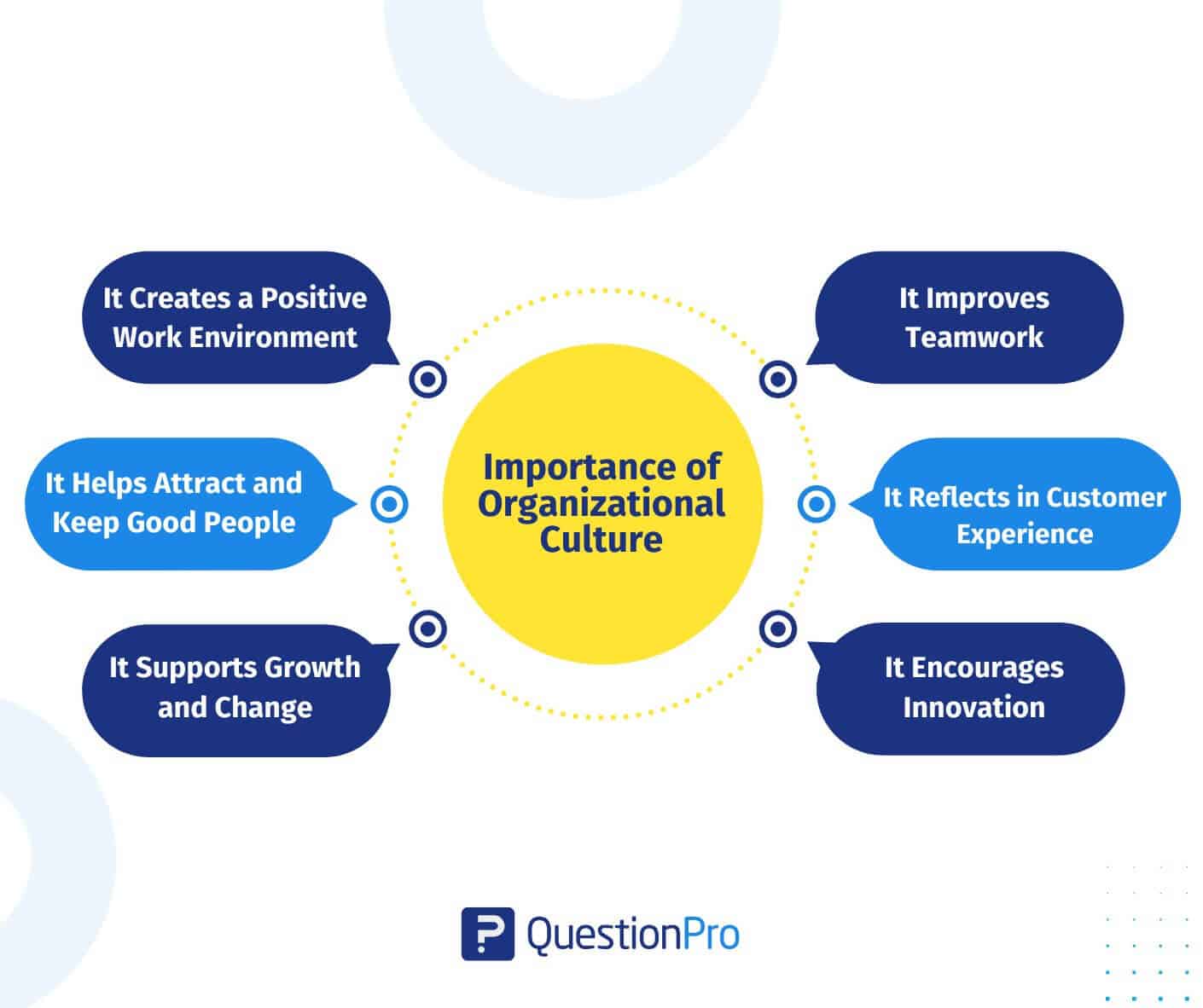
Have you ever walked into a workplace and instantly felt the vibe, whether it was friendly, stressful, energetic, or quiet? That feeling comes from something called the importance of organizational culture.
It’s not just about company perks or office decor, it’s about how people treat each other, how leaders lead, and how everyone works together. It affects employee happiness, teamwork, performance, and even the success of the business.
In this blog, we’ll explore why organizational culture matters so much and how it can shape everything from daily work to long-term success. Whether you’re a business leader or an employee, understanding the power of culture can make a big difference.
What is Organizational Culture?
Organizational culture is like the personality of a company. It’s the way people in the entire organization think, behave, and work together. You can feel it when you walk into a workplace – it’s the vibe, the atmosphere, and the way things get done.
It includes things like:
- Values – What the company stands for (like honesty, teamwork, or innovation)
- Beliefs – What people in the company believe is important
- Norms – The unwritten rules about how to act
- Habits – How employees usually do things every day
For example, some companies are very formal. People wear suits, speak politely, and follow strict rules. Others are more relaxed; they might wear jeans, use first names, and focus more on being creative.
Organizational culture influences how employees interact with one another and how they interact with customers. A strong, positive culture can make people feel happy, supported, and motivated. However, a negative or unclear culture can lead to confusion, stress, and poor teamwork.
Importance of Organizational Culture for Business Success
A company’s culture is the foundation that shapes how employees work, interact, and grow within a company. It’s the invisible force that boosts motivation, collaboration, and success.
Understanding the importance of organizational culture can help businesses create a positive environment where people thrive and companies flourish. Here’s why it matters and some pro tips to make it stronger.

1. It Creates a Positive Work Environment
Organizational culture sets the tone for the workplace atmosphere. When the culture promotes respect, support, and fairness, employees feel safe and motivated. A positive workplace culture:
- Reduces stress
- Increases job satisfaction and
- Promotes mental well-being
This leads to higher productivity and less absenteeism.
2. It Improves Teamwork
A healthy culture builds trust, transparency, and open communication. When people feel psychologically safe, they collaborate more freely and resolve conflicts constructively. Shared values create a sense of belonging, making team members more aligned toward common goals.
3. It Helps Attract and Keep Good People
In today’s competitive job market, culture often becomes the deciding factor for candidates choosing between offers. A company with a positive reputation for culture attracts high-quality talent who are eager to contribute and grow. Moreover, employees who feel connected to the culture stay longer, reducing turnover costs and preserving institutional knowledge.
ProTip: Highlight your company’s values, success stories, and employee testimonials on your website and social media to appeal to potential hires.
4. It Reflects on Customer Experience
Employees are the face of your brand to customers. When employees feel valued and engaged, it reflects in their attitude and service quality. A culture that prioritizes employee satisfaction naturally translates to:
- Better customer interactions
- Higher employee retention and
- Increased word-of-mouth referrals
ProTip: Train and support employees regularly on customer service aligned with company values, and recognize outstanding customer-focused behaviors publicly.
5. It Supports Growth and Change
No company remains the same forever. Whether it’s scaling up, adopting new technology, or shifting business strategies, a strong culture provides a foundation of shared purpose and trust. This foundation makes employees more adaptable and willing to embrace change, minimizing resistance and disruption.
ProTip: Involve employees early in change initiatives through surveys and feedback sessions to build ownership and reduce uncertainty. If you are interested in conducting a survey, contact QuestionPro.
6. It Encourages Innovation
A culture that encourages experimentation and values diverse perspectives builds creativity. Employees feel empowered to:
- Share ideas
- Challenge the status quo and
- Learn from failures
This innovative spirit is essential for staying competitive, solving problems in new ways, and driving continuous improvement.
How to Build a Positive Organizational Culture?
Organizational culture is what shapes the way people work and connect inside a company. A positive culture creates a workplace where people feel happy, respected, and motivated. But how do you actually build one?
Here’s a clear and easy guide to help you in a positive culture-building step by step:
- Start with a Strong Organization’s Core Values
Every good culture begins with clear values. These are the beliefs that guide your company, like honesty, respect, teamwork, and innovation.
- Lead by Example
Leaders influence organizational culture and play a huge role in shaping culture. Shaping organizational culture means guiding values and behaviors to build a strong workplace environment.
- Communicate Openly and Often
Good communication is key. When employees feel heard and informed, they’re more engaged and less stressed.
- Recognize employees
A simple thank you can go a long way. People want to feel valued for their work.
- Create a Safe and Inclusive Space
Everyone should feel safe to be themselves at work. Respect differences and make sure everyone feels welcome and included.
- Encourage Work-Life Balance
A healthy culture respects personal time. People can’t give their best if they’re overworked or burned out.
- Offer Growth Opportunities
Employees stay loyal when they see a future in the company. A positive company culture encourages learning and development.
- Build Team Connections
People are happier when they feel connected to their team. Culture grows when relationships are strong.
- Handle Conflict Respectfully
No workplace is perfect. But how you handle problems says a lot about your culture.
- Stay Consistent
Culture doesn’t grow overnight. It takes time, effort, and consistency.
How to Develop an Organizational Culture with QuestionPro Employee Experience?
Building a strong organizational culture requires listening to your employees and understanding their needs. QuestionPro Employee Experience provides the tools to help you do just that, making it easier to develop a positive and lasting culture in your workplace. Here’s how you can use QuestionPro Employee Experience to create a thriving organizational culture:
1. Start with Listening: Gather Employee Feedback
Building company culture begins by understanding what your employees are experiencing. QuestionPro EX makes it easy with:
- Employee Engagement Surveys
- Culture Diagnostic Tools
- Onboarding & Exit Surveys
These tools help you find out how employees truly feel about leadership skills, communication, recognition, inclusion, and more. Company leadership influences organizational culture to influence employee behaviors, and the work environment that guides how employees interact and perform.
ProTip: Use open-ended questions to give employees a voice. Example: What’s one thing we could do to improve organizational culture?
2. Analyze Insights with Powerful Dashboards
Once you collect feedback, QuestionPro EX provides real-time dashboards and advanced analytics to help you understand:
- What employees value most
- What’s hurting morale or engagement
- How culture varies across departments or teams
You’ll be able to spot trends, challenges, and strengths in your organization’s culture.
ProTip: Filter results by demographics, location, or job role to uncover hidden patterns.
3. Create a Culture Action Plan
The real power of QuestionPro EX is turning insights into action. Based on your survey results, you can:
- Identify key focus areas (e.g., recognition, manager support, collaboration)
- Set clear goals for cultural improvement
- Build targeted action plans for each department or team
4. Use Pulse Surveys for Ongoing Check-ins
Culture isn’t a one-time project; it’s a living thing. With QuestionPro EX, you can send pulse surveys regularly to check in with employees and measure progress.
These short, frequent surveys help you:
- Keep a close eye on morale
- Test the impact of recent changes
- Stay connected with employee sentiment in real-time
Conclusion
The importance of organizational culture goes far beyond just having a set of values or office rules. It influences how employees feel at work, how they communicate, how teams function, and how the business grows.
A positive organizational culture builds trust, boosts morale, and leads to more engaged employees. It attracts the right talent, encourages innovation, and helps everyone work toward a common goal. On the other hand, a weak culture can lead to poor communication, low motivation, and high employee turnover.
Ultimately, the significance of a strong organizational culture lies in its ability to shape the entire employee experience and drive long-term success. By investing in a strong company culture and thriving culture, companies create a workplace where people truly want to be, and that’s where real growth begins.
QuestionPro offers powerful tools to help the most successful organizations measure and improve their culture by gathering employee feedback and insights. With its easy-to-use platform, companies can better understand their workforce and take meaningful steps to build a positive corporate culture.
Frequently Asked Questions (FAQs)
Answer: The importance of organizational culture lies in its ability to shape employee behavior, promote teamwork, and create a positive work environment that supports both individual and business success.
Answer: Key elements of organizational culture include core values, leadership style, communication patterns, workplace practices, and employee behaviors.
Answer: A company can improve its organizational culture by listening to employees, encouraging open communication, recognizing achievements, and aligning actions with the company’s core values.
Answer: Organizational culture research helps businesses understand the values, beliefs, and behaviors that shape their work environment, enabling them to make informed decisions to improve employee satisfaction and overall performance.
Answer: Yes, tools like employee surveys, feedback platforms (like QuestionPro), and culture assessments can help measure and understand your organizational culture.







